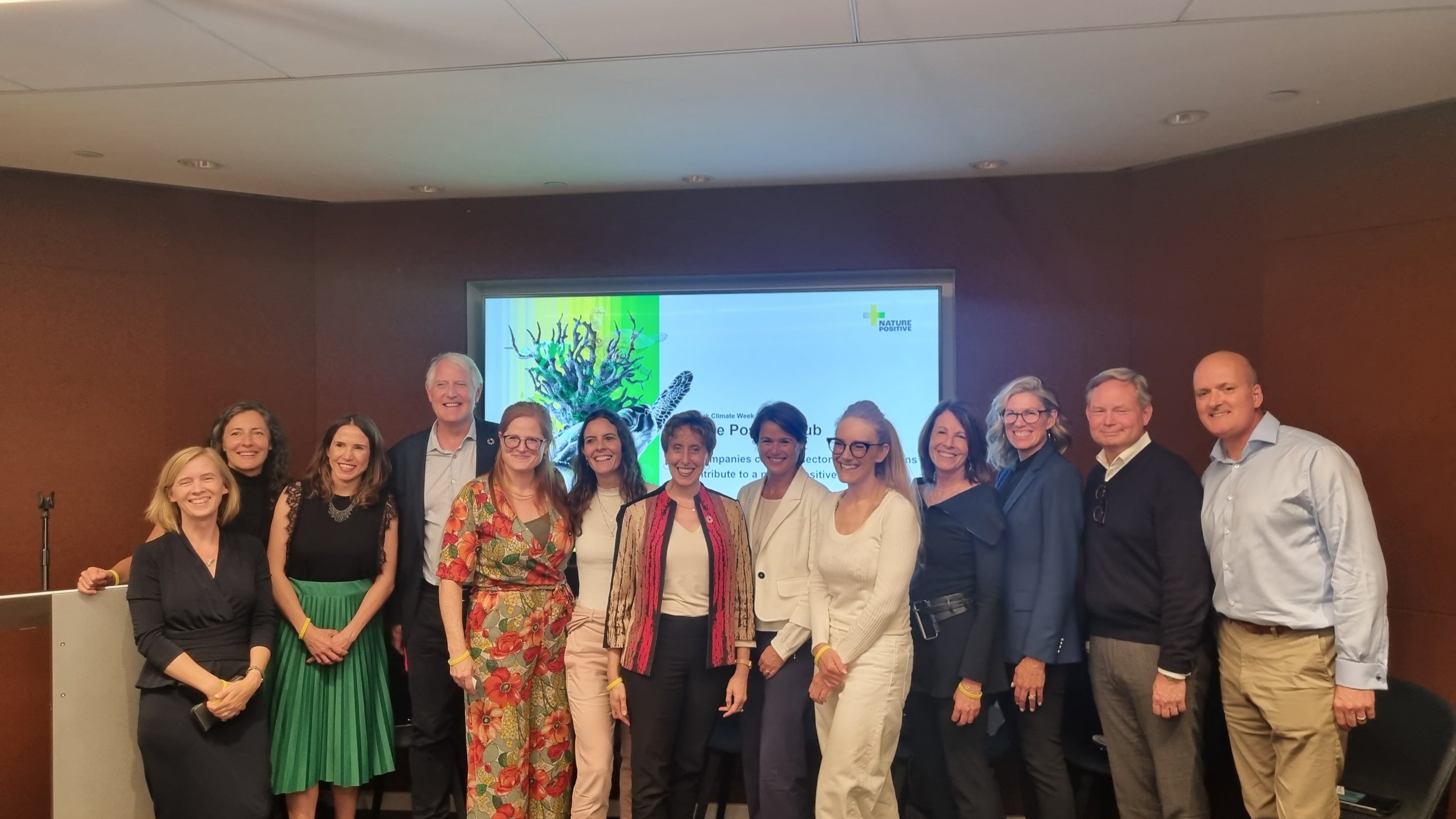At New York Climate Week, leading experts discuss sector actions for nature
On 12 September, Business for Nature, the World Business Council for Sustainable Development (WBCSD) and the World Economic Forum launched new guidance to set out the priority actions businesses across 12 sectors must take to contribute towards a nature-positive future. Following the launch, an insightful discussion took place at the Nature Positive Hub, part of the annual New York Climate Week, raising awareness of the sector actions to an international audience, engaging companies to scale and speed up action towards a nature-positive economy and showcasing examples of companies already leading the way.
Setting the stage
Richard Mattison, Vice Chair of S&P Global and Chief Executive Officer of S&P Global Trucost, opened the event by spotlighting the substantial link between business and nature: "A recent S&P Global study shows that 85% of the world's largest companies have a significant dependency on nature through their direct operations. "He highlighted why businesses need to consider their actions on nature in the context of their net zero and climate plans, how they should consider nature in investment decisions as well as how to mitigate negative impacts.
Perspectives from key business sectors
Businesses from several sectors were represented at the event, from agri-food and building materials to finance and forestry. During a discussion moderated by Diane Holdorf, Executive Vice President, Pathways, WBCSD and Akanksha Khatri, Head, Nature and Biodiversity, World Economic Forum, speakers shared their experience of implementing sector-specific actions to transform their operations and value chains.
Keith Tuffley, Global Co-Head of the Sustainability & Corporate Transitions Group at Citi, emphasized the value of collective learning and drew parallels with climate action, noting: "Where we are in the nature space is similar to where we were in climate after the Paris Agreement was adopted. We need to leverage all the lessons learned from the climate journey. To translate the Global Biodiversity Framework into actions on a company level, Citi engages with other companies to understand what’s in their value chain and what their impacts and dependencies on nature are."
Navigating through the intricacies of sector-specific challenges, Renata Pollini, Head of Nature at Holcim, highlighted the pivotal role of policy support in accelerating nature action:
"While it’s important for the private sector to innovate, we need public policy to mainstream and accelerate nature action," she said, underscoring Holcim's active engagement to influence national policies to improve waste reduction and recycling.
Alison Taylor, Chief Sustainability Officer at ADM, explained the complex and exhilarating journey toward a nature-positive transition. "Being in the agricultural food transition journey is both scary and exciting," Taylor conveyed, stressing the need for simple solutions, such as granting farmers land rights in developing countries, to addressing multifaceted agricultural and financing challenges.
Helena Pavese, Head of Environment at Suzano, turned the spotlight on the need to dispel common misconceptions about the forest sector. "We don’t cut down old-grown forests but only harvest the trees we plant," she clarified, underscoring the importance of stakeholder collaboration across their value chain, which embraces Indigenous Communities and NGOs, to foster open dialogue and mutual understanding.
Ulrike Sapiro, Chief Sustainability Officer at Henkel, pivoted the discussion towards the vital intersection of maintaining quality while mitigating environmental impacts in the chemical industry. "To move towards a circular economy, we need to redesign our packaging and avoid using materials with a negative impact on nature while maintaining quality," emphasizing the need to harness innovation and technology while ensuring the longevity and sustainability of products.
We were also joined by several other speakers, including Emily McKenzie, Technical Director at TNFD, who talked about the alignment and launch of TNFD, Erin Billman, Executive Director SBTN, Camilla Drejer, Managing Director UKI Corporate, Alex Wittenberg, Partner, Insurance and Asset Management, Climate and Sustainability, Oliver Wyman, and Kathleen Abbott, Global Executive Director Clients and Business Development, Arcadis.
Concluding remarks
Eva Zabey, CEO of Business for Nature, summarized the discussion, underscoring the imperative for businesses to understand their interactions with nature within their sector.
“The sector actions provide a pragmatic roadmap, enabling companies to navigate through complexity and make credible contributions towards a nature-positive future”.
It’s Now for Nature
‘It’s Now for Nature’ is a global campaign launching on 9 November to rally all businesses to act on nature and contribute towards a nature-positive world by 2030. Through a new Nature Strategy Handbook, the campaign will encourage businesses and financial institutions to develop and publish a nature strategy. This enables them to make a meaningful contribution towards the global goal to halt and reverse nature loss by 2030.
Join one of our global launch webinars on 9 November at 10am EST and 4pm EST to find out how to get involved.


